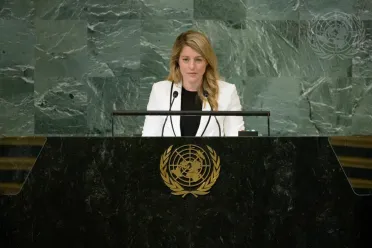Statement
Statement summary
MÉLANIE JOLY, Minister for Foreign Affairs of Canada, said that in responding to today’s immense global challenges the international community can either defend the rules it has collectively developed or accept that these can be broken by the powerful, leading back to dark times of conflicts, displacements and human suffering. “For Canada, the choice is clear […] We need more of the United Nations, not less; we need a UN that is effective, efficient, relevant and accountable,” she stressed, spotlighting her country’s engagement to conceive, develop and strengthen multilateralism. Ensuring the Sustainable Development Goals remain on track must be addressed head on. Turning to Ukraine, she said that while the Assembly has spoken clearly that the Russian Federation’s aggression against that country violates the United Nations Charter, President Vladimir Putin has announced that he will conscript more young people into his war of choice. Moscow has threatened collective security with dangerous nuclear rhetoric and caused enormous civilian suffering, triggering a global food security crisis — a situation which must be addressed with imagination and determination. “A permanent seat on the Security Council is not a license to kill, nor to silence anyone, and it should never guarantee impunity,” she stressed.
She expressed Canada’s commitment to work towards a just and equitable reform of the international financial system, which is crucial for equity, global peace and stability. Her country aims to end the COVID-19 pandemic and prevent other pandemics, while combating HIV, tuberculosis and malaria. Last week, Canadian Prime Minister Justin Trudeau committed to invest $1.2 billion towards that goal. She also reiterated her country’s commitment to cut its greenhouse gas emissions by 40 to 45 per cent by 2030 and achieve carbon neutrality by 2050. Further, she stressed that Montreal would host the United Nations Biodiversity Conference, under the presidency of China.
Noting that certain countries are restricting civil liberties, violating human rights and conducting widespread surveillance of their populations, she said this phenomenon is particularly visible in the Xinjiang region of China. The findings of the United Nations Human Rights Office report reflect credible accusations of abuses amounting to war crimes and crimes against humanity. She stressed that human rights are universal in nature and States “cannot hide behind the pretext of national sovereignty to violate them”. She also touched on domestic efforts to combat systemic racism and pursue reconciliation with indigenous peoples. On women rights, she pointed to the situations in Afghanistan, Myanmar and Iran as well as in Sudan, Haiti and Canada, where women peacebuilders and activists are being targeted. Her country will continue to push for justice for Rohingya women. “And we will not rest until those responsible for sexual violence committed in Ukraine are held to account,” she affirmed. To restore Member States’ trust in the Security Council, she encouraged efforts to reduce the power of the veto, expand Council membership and ensure the voices of all are heard, and responded to, across the United Nations system.

